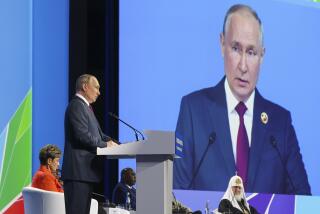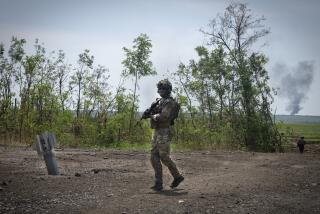U.S. Troops Join a Fight Beside Kurds
- Share via
GHAZAR, Iraq — U.S. soldiers joined their Kurdish allies in close combat against Iraqi forces during a daylong battle Thursday on the edge of this northern town.
Until this battle, front-line U.S. troops in this region for the most part had served as forward air controllers for the Kurdish fighters, selecting targets and calling in airstrikes. But the Americans were drawn into the fight Thursday morning after coming under attack.
The prelude to the battle was an unexpected withdrawal by Iraqi forces from a ridge overlooking the village of Kalak at sunset Wednesday. The next morning, a unit of U.S. Special Forces moved up the main highway with Kurdish fighters toward the strategically important northern city of Mosul.
On the edge of Ghazar, about 25 miles east of Mosul, Iraqi soldiers opened fire with machine guns, rocket-propelled grenades and mortars. Pinned down next to a highway bridge, American soldiers joined with the Kurdish fighters to push back the Iraqis.
“I’m not an air controller. I was shooting,” said Staff Sgt. Terry Singer of Choctaw, Okla., after the firefight ended.
The Iraqis fought throughout the day to regain control of the bridge, at times firing 82-millimeter airburst mortar shells, fused to explode in midair and rain burning, jagged shrapnel.
Dug into foxholes overlooking the town, Special Forces soldiers called in wave after wave of airstrikes that sent huge, black clouds roiling hundreds of yards into the sky.
The retreats and tactical withdrawals by Iraqi troops across the northern front have allowed hundreds of Kurdish fighters to spill across minefields and creep closer to strategic cities such as Mosul and Kirkuk.
As Iraqi troops have pulled back, lightly armed Kurdish fighters -- known as peshmerga, or “those who face death” -- have taken over bunkers left behind. Wajy Barzani, high commander of the Kurdistan Democratic Party’s troops, predicted Iraqi forces would withdraw from Ghazar before dawn today, allowing the Kurds and U.S. soldiers to head for Mosul, whose population is mostly Arab.
Neighboring Turkey, long an important U.S. ally, is concerned that the Kurds will use battlefield victories as leverage to gain autonomy in a postwar Iraq federation -- possibly inspiring Turkey’s own restive Kurdish population to rebel. The two major Kurdish parties in northern Iraq have pledged they will not attack Mosul and Kirkuk without U.S. permission.
On Wednesday, Turkish leaders warned Secretary of State Colin L. Powell in Ankara, their capital, that they would feel justified in sending troops into northern Iraq to prevent the peshmerga from taking the two cities. “The Americans are very sensitive to our concerns, and they gave us full guarantees in this respect,” Turkish Foreign Minister Abdullah Gul said in a later interview. “War is a dynamic process and if the conditions I mentioned do arise, we as a sovereign state will have the right to act independently.”
But Barzani said he didn’t think the Turks “will take this opportunity to intervene in the area as they have come to the conclusion that we have no evil intentions.”
“We are working under the control of allied forces,” he added, “and we will not do anything on our own.”
The Kurds, meanwhile, are urging the U.S. to tap their underground in Mosul and Kirkuk, saying their agents -- using satellite phones, smuggling routes and couriers -- could provide the Americans with critical intelligence before and during an attack. They also say their fighters could man the front lines, helping to limit U.S. casualties.
But on Thursday, the focus was on Ghazar. The back-and-forth battle began when U.S. Special Forces and Kurdish fighters moved to the edge of town to set up an observation post, said the unit’s commander, who identified himself only as a Special Forces sergeant.
“We came up over this hill, and they pretty much opened up,” Singer said, after pulling back several hundred yards from the highway. “We ended up being pinned down by the bridge.”
Singer praised the peshmerga as well-disciplined fighters who, even without advanced equipment, can match much of what the U.S. troops do.
As he talked, another Iraqi mortar round exploded a few hundred yards from the ridgeline trenches and foxholes where Singer sat. The Special Forces controllers used scopes and communications equipment to spot Iraqi positions and direct smart bombs to the targets.
Sarbast Babiry, an impatient peshmerga commander who pored over a grid map with the Special Forces sergeant, wanted to know why there was a pause in the bombing.
“We’re bringing in more planes,” the American assured him. “The planes were out of bombs.” Then an air controller made a radio call: “OK, Fort Apache, I have the coordinates for the mortar position. Advise when ready to copy.”
When the warplanes streaked in again, they pummeled Iraqi trucks, mortar positions and other targets. At least one strike put two bombs on the target at once, sending twin black plumes rising high on the horizon.
But after each wave of airstrikes, the Iraqis resumed their counterattack with mortars and sniper fire that whistled over the ridgeline. In midafternoon, the air controllers’ radio crackled to life with a status report, including a body count of Iraqi troops killed in action, or KIA. There were no allied casualties.
“Egypt Tango, Egypt Tango, this is Talon, over,” the air controller said.
“Go ahead, Talon,” the radio came back.
“Talon Tango reports four trucks destroyed, 50 [Iraqi] KIA and one mortar position destroyed. Over,” the controller said.
*
Times staff writers Jeffrey Fleishman in Sulaymaniyah, Iraq, and Richard Boudreaux in Ankara contributed to this report.
More to Read
Sign up for Essential California
The most important California stories and recommendations in your inbox every morning.
You may occasionally receive promotional content from the Los Angeles Times.













